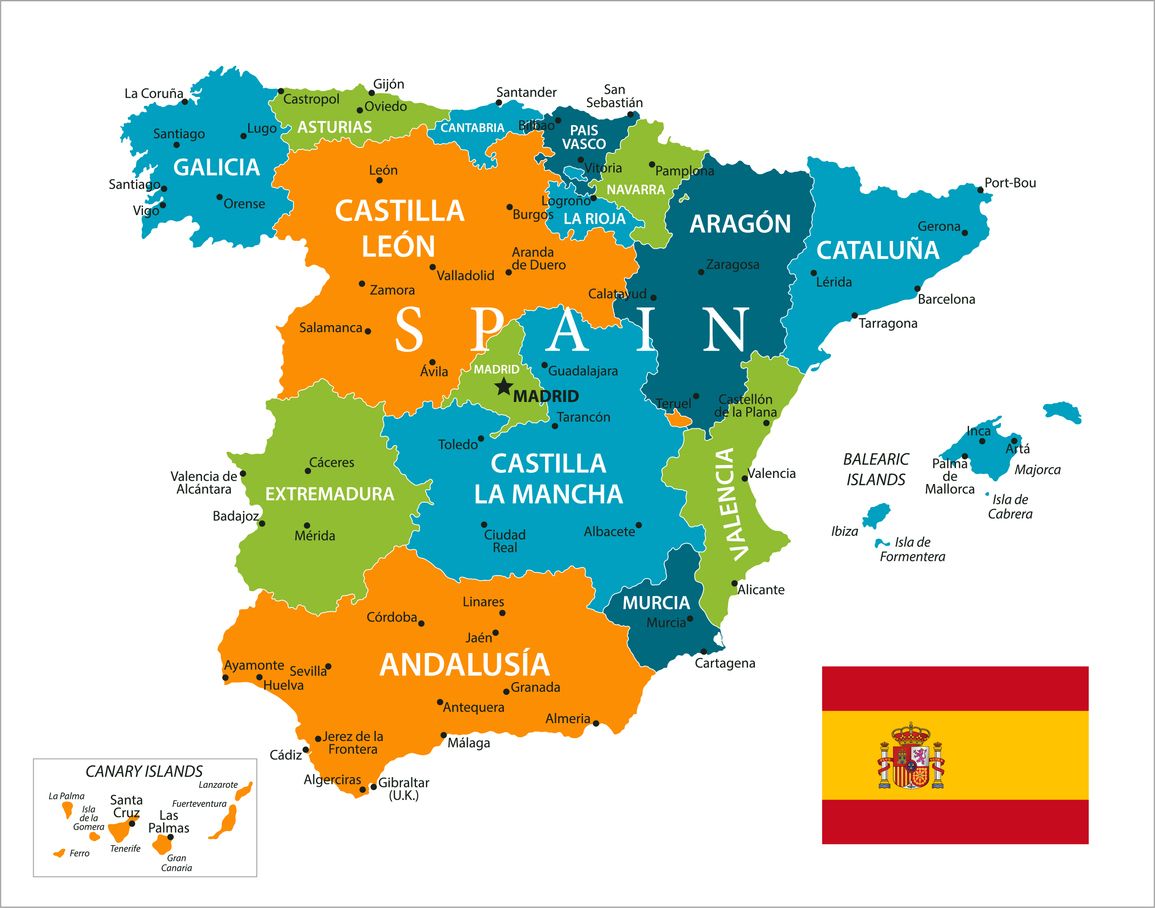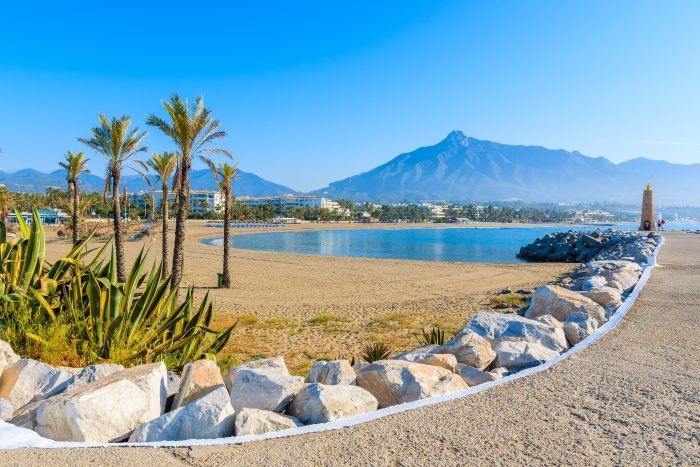In this article:
- Who pays Wealth Tax in Spain?
- What is included in your estate?
- How is Wealth Tax calculated in Spain?
- What happens in the autonomous regions?
- How to reduce my Wealth Tax rate: The 60% limitation rule
- Solidarity Tax – What it is and how it interacts
- Is Wealth Tax payable every year?
- Are Wealth Tax and Property Tax the same?
- What is the difference between Wealth Tax and Income Tax?
When planning to buy a property in Spain, it’s natural to think about sunshine, lifestyle, and location, not tax codes. Yet understanding Spain’s Wealth Tax (Impuesto sobre el Patrimonio) can save you from confusion and unnecessary worry later down the line.
Wealth Tax is a levy on your total net assets, designed to ensure those with higher-value property and investments contribute proportionally to public spending. It’s not an income tax and doesn’t apply to day-to-day earnings, but rather to your total wealth at the end of each year.
For most international buyers, it won’t apply at all. Spain’s thresholds are high enough that only a small percentage of residents or non-residents actually pay it. But knowing how it works helps you make informed decisions about where to buy, how to structure ownership, and what reliefs may apply in your chosen region.
As Spanish property lawyer Alex Radford explains:
“Wealth Tax in Spain applies to residents and non-residents.”
The key is understanding whether you fall into either category, which assets count towards your total estate, and how Spain’s autonomous regions set their own allowances. This guide explains all of that, and includes practical insights and real-world examples to help you plan with confidence.
Who pays Wealth Tax in Spain?
Wealth Tax applies to individuals based on the total value of their assets after deducting debts, loans, and allowances. It doesn’t matter if those assets are tied up in property, investments, or savings, what matters is their combined net worth.
Whether you are resident or non-resident in Spain makes the biggest difference in determining what you owe, as it affects the scope of assets included in your taxable base.
Residents
If you are a tax resident in Spain – meaning you spend more than 183 days a year there or your main economic interests are located in Spain – you’re taxed on your worldwide assets. That includes property in Spain, investments held abroad, overseas savings, and any other valuable assets.
As Alex explains:
“If you’re a resident in Spain and you’ve got assets in Spain and outside of Spain, then you could be subject to Wealth Tax, depending on the assets that you have and the value of those.”
Residents benefit from national allowances – €700,000 per person, plus an extra €300,000 exemption for your main home if you live in it as your principal residence.
Example: A retired couple living full-time in Valencia own a home worth €600,000 and worldwide savings of €1.2 million. Their combined total is €1.8 million. With €1 million in exemptions (€500,000 each), they would only pay Wealth Tax on €800,000 of assets – meaning their annual liability would be modest.
Non-residents
If you’re a non-resident, only your Spanish assets are subject to Wealth Tax. This generally includes:
Spanish property you own (whether rented or not)
Spanish bank accounts
Investments or shares in Spanish companies
Alex clarifies:
“It’s on worldwide assets for residents, and those located in Spain if you’re a non-resident.”
Importantly, non-residents also have access to the same €700,000 allowance per person, and the tax is applied individually rather than jointly.
“It’s per person – so typically, if a couple buy a property, they would have that allowance each,” says Alex.
For example, if two non-residents buy a holiday home in Valencia worth €1.4 million, they would each be entitled to a €700,000 allowance, therefore no Wealth Tax would be due.
In practice, this means most overseas property owners are well below the Wealth Tax threshold unless they hold multiple high-value assets in Spain.
What is included in your estate?

Your “estate” for Wealth Tax purposes includes almost everything you own that has value, minus any debts associated with those assets.
Assets typically included:
- Property (main home, holiday homes, rental properties)
- Bank deposits and savings accounts
- Investments such as shares, bonds, or funds
- Vehicles, boats, and aircraft
- Art, jewellery, or other collectibles
- Business ownership stakes
You can deduct any loans or mortgages linked to those assets. For example, if you own a €600,000 property with a €200,000 mortgage, only €400,000 counts towards your Wealth Tax base.
Residents vs non-residents
Residents declare all global assets, including those held abroad. Non-residents only declare assets physically located in Spain.
Alex gives a clear example of how this works in practice:
“In the Costa Blanca area, so Valencia region, if you’re married and your wife or your partner and yourself have got assets of €700,000 each or greater — say €1.4 million — then you start to pay Wealth Tax.”
In short, it’s your net worth in Spain (for non-residents) or total net worth worldwide (for residents) that determines your liability.
How is Wealth Tax calculated in Spain?

Spain’s Wealth Tax is progressive, which means the more you own, the higher the percentage you pay on the amount above your regional exemption. It’s not a flat charge across all your wealth, but a tiered system designed to keep taxation fair.
1. Calculate your net assets
- General personal allowance: €700,000 per person
- Main home allowance: €300,000 (for residents only)
Start with your total assets (property, savings, investments, vehicles, etc.) and subtract any related debts, like mortgages. The result is your net taxable wealth.
Example:
- Property in Spain: €900,000
- Mortgage: €250,000
- Bank savings: €200,000
- Investments: €100,000
Total assets: €1.2 million
Debts: €250,000
Net taxable wealth: €950,000
After deducting the national €700,000 personal allowance, Wealth Tax would apply to €250,000 of the total.
2. Apply the relevant rates
Typical Rates (2025 national scale)
| Taxable wealth (after allowances) | Rate |
| Up to €167,129 | 0.2% |
| €167,129 - €334,253 | 0.3% |
| €334,253 - €668,500 | 0.5% |
| €668,500 - €1,337,000 | 0.9% |
| €1,337,000 - €2,673,999 | 1.3% |
| €2,673,999 - €5,347,998 | 1.7% |
| €5,347,998 - €10,695,996 | 2.1% |
| Over €10,695,996 | 3.5% |
However, these rates vary by region. It’s always best to check local regulations.
3. Apply regional thresholds and reliefs
Spain’s regional governments can increase or reduce the allowances, meaning two homeowners with similar properties could have very different Wealth Tax bills depending on location.
For example:
- Andalusia: Threshold is €3 million per person — meaning very few owners pay it.
- Valencia: Threshold is €700,000 per person.
- Madrid: Full 100% relief (no Wealth Tax due, though Solidarity Tax may apply).
Alex summarises this difference clearly:
“In Andalusia, we’ve got higher levels here. So it starts at the €3 million mark
Example calculation
A couple in Valencia jointly own global assets worth €1.6 million (€800,000 each). With allowances of €700,000 each, they would pay Wealth Tax on €100,000 each.
At a 0.2% rate, the total bill would be just €200 per person — or €400 combined.
So while “Wealth Tax” can sound intimidating, for most homeowners it’s a minimal cost — or not applicable at all.
What happens in the autonomous regions?

Wealth Tax is regulated nationally but collected and adjusted by Spain’s 17 autonomous communities. This means thresholds and reliefs can vary dramatically depending on where you live or buy.
As Alex notes:
“In Andalusia, we’ve got higher levels here. So it starts at the €3 million mark.”
Here’s a snapshot of 2025 regional variations:
| Region | Individual allowance | Notable details |
| Andalusia | €3,00,000 | Very high threshold; most residents exempt. |
| Valencian Community | €700,000 | National scale applies; couples get €1.4M combined. |
| Madrid | 100% relief | Wealth Tax technically exists but is offset by full exemption. |
| Catalonia | €500,000 | Lower threshold, higher effective rates. |
| Murcia | €700,000 | Matches national scale. |
| Balearic Islands | €700,000 | Progressive rates similar to national scale. |
| Galicia | €700,000 | Standard national scale applies. |
These differences mean that where you live or hold property can influence whether you owe Wealth Tax.
For example, owning a €2 million home in Andalusia would not trigger Wealth Tax, but the same property in Catalonia could.
This is one of the reasons why consulting a local tax advisor or gestor is so valuable before completing your purchase.
How to reduce my Wealth Tax rate: The 60% limitation rule

Spain offers a built-in safeguard known as the 60% limitation rule, designed to prevent excessive tax burdens for those with high asset values but relatively low incomes.
Under this rule, your combined Wealth Tax and Income Tax bill cannot exceed 60% of your total taxable income for the year.
If it does, you can apply for a reduction, capped at an 80% discount on your Wealth Tax liability.
Example:
Imagine you earn €30,000 per year in Spain but your Wealth Tax bill is €20,000.
- 60% of your income = €18,000.
- Your total (Income + Wealth Tax = €30,000 + €20,000 = €50,000) exceeds this limit.
- You could therefore claim an €8,000 Wealth Tax reduction to bring the total down to €18,000 (the 60% threshold).
This rule ensures that Wealth Tax never disproportionately penalises those with assets but modest annual incomes, such as retirees or long-term property owners.
Solidarity Tax – What it is and how it interacts

Spain’s Solidarity Tax (Impuesto Temporal de Solidaridad de las Grandes Fortunas) was introduced in 2023 as a temporary measure to ensure consistency across regions. It specifically targets individuals with net assets exceeding €3 million, acting as a “national top-up” where regional exemptions are high.
Why it exists
In some regions, such as Madrid and Andalusia, Wealth Tax is heavily reduced or fully exempt. To ensure equity across Spain, the national government introduced the Solidarity Tax so that high-net-worth individuals in these regions contribute at a similar level to those in others.
It mirrors the Wealth Tax structure almost exactly but only applies to the portion of assets above €3 million.
Solidarity Tax rates:
- €3–5 million: 1.7%
- €5–10 million: 2.1%
- Over €10 million: 3.5%
If you already pay regional Wealth Tax, the Solidarity Tax is offset to avoid double taxation.
In short, it only applies to those who would otherwise be exempt in high-relief regions.
For most buyers, this tax will never apply, but it’s important to be aware of its existence when planning large investments.
Example:
A resident of Madrid with €5 million in net assets would pay nothing under Madrid’s 100% Wealth Tax relief, but they would owe approximately €34,000 under the Solidarity Tax (1.7% on the €2 million above the €3 million threshold).
While initially introduced as temporary, the Solidarity Tax has been extended through at least 2025 and is expected to remain in place until Spain completes a broader review of its regional tax balance.
For more information about Solidarity Tax, you can explore more via the Spanish Tax Agency.
Is Wealth Tax payable every year?
Yes, Wealth Tax is an annual obligation.
It’s calculated based on your total net worth as of 31 December each year, and payable between April and June of the following year, alongside your annual income tax return.
Most residents file directly through the Agencia Tributaria portal, while non-residents often appoint a tax representative or gestor to handle the filing.
You’ll need to declare the cadastral value of your property, bank balances, and other assets as of year-end. Keeping good financial records simplifies this process.
Are Wealth Tax and Property Tax the same?

No, Wealth Tax and Property Tax (IBI) are completely different.
| Tax | Applies | Who pays | Frequency |
| IBI (Impuesto sobre Bienes Inmuebles) | The property itself (local tax) | Owner | Annual (paid to local local council) |
| Wealth Tax (Impuesto sobre el Patrimonio) | Your total net worth | Individuals above threshold | Annual (filed nationally) |
| IRNR (Non-Residents Income Tax) | Imputed or actual rental income | Non-residents | Annual (filed nationally) |
IBI is a small municipal fee similar to council tax, while Wealth Tax is an assessment of your overall wealth.
What is the difference between Wealth Tax and Income Tax?

Wealth Tax and Income Tax are separate obligations — but they interact through the 60% limitation rule.
- Income Tax (IRPF or IRNR) is based on your annual earnings (salary, pensions, or rental income).
- Wealth Tax (Impuesto sobre el Patrimonio) is based on the value of your assets as of 31 December each year.
In other words, you could owe both taxes if you earn income in Spain and also own high-value assets, but the 60% rule ensures your combined liability remains reasonable.
Wealth Tax can sound intimidating at first, but for most buyers it’s a non-issue — and for those who do qualify, it’s straightforward to manage with good advice.
As Alex Radford sums up:
“If you bought a property in Andalusia for €1 million, you wouldn’t have to worry about Wealth Tax because it’s lower than the €3 million [threshold].”
By understanding the thresholds, allowances, and regional rules, you can plan your finances effectively and enjoy your property in Spain with confidence.
Be the first to comment!